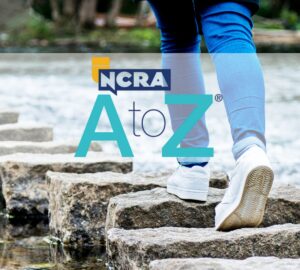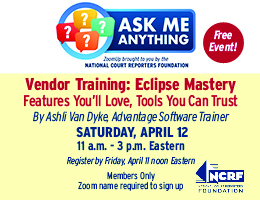By Jason Meadors
The call
Through Denise Phipps and her company, Captions Unlimited, I received an assignment to provide realtime display, or CART services, to Judge Charles Ray in Bethel, Alaska. Judge Ray is the only judge in the United States to preside over a court of general jurisdiction who is completely deaf. It turns out that he’s a very nice, amiable, smart, and caring man whose speaking voice betrays no hint of his lack of hearing. He’s late- and sudden-deafened, having been stricken with a virus that inexplicably and arbitrarily took away hearing from one ear overnight, then the other several years later.
There are people who are comfortable with CART, and I admire them, because I’m not one of them. Nevertheless, the need was obviously there, and I resolved to do my best. Denise had me start out by working with her in supplying CART for Judge Ray at the Alaska judges’ convention in Girdwood, a resort outside Anchorage. Job requirements aside, it was entirely gratifying to see the judge interacting socially, laughing at the jokes and contributing to them, and joining in animated discussion at the seminars. Our services greatly aided the judge in participating in the event.
And lest you think this is my bragfest about my theoretical mad CART skills: No. A team of CART reporters has been providing these services for the past two years and have been doing it very well and satisfactorily for the state judicial department. I am very much the tag-along guy at the tail end of this team of otherwise outstanding CART providers.
The first stop
I had never been to Alaska, other than as a quick stop at night on the way overseas. Denise met me at the airport, and we were ferried to the convention by the CFO of Alaska’s judicial department, who spoke enthusiastically of how to help Judge Ray. She didn’t focus on budget; she spoke of results, which I found rather refreshing from a public official.
It is a most impressive drive to Girdwood, the resort where the convention was held. The rocky shore and the flat areas that rise up dramatically to towering snowcapped ranges are beautiful and inspiring. Then getting up the next morning, I noticed after the normal morning routine that it seemed to be unusually dark in the room, even though it was 8 a.m. I thought that maybe it was a cloudy day. I opened the curtains, and it was still pitch black outside in the autumn morning. Now I saw some real charm and differences of life up north.
The CART part was the simplest of setups. Denise or I sat next to Judge Ray, set up our realtime on our laptop, and wrote. The judge read it off the CAT screen, whether we were in a classroom or social environment. The CART we provided helped him to interact in conversations, participate in jokes, and ask questions and engage in questions with seminar presenters and attendees.
After the convention (and with me feeling tentatively more hopeful about my ability to provide the quality of CART that was needed), the judge and his wife drove us out to the airport, Denise to return to the lower 48, and me to get to Bethel.
If all roads lead to Rome, then no roads lead to Bethel. Unless you hike or dogsled or use a snowmachine (they are not called snowmobiles there), you come to town either through air or over water. Big planes fly in and out of this town of 6,500 several times daily, and you wonder how such a small community can support this level of air traffic, until you realize that 1) it’s the only way for a lot of them to get in and out, and 2) the planes are half-walled off for cargo hauls in the other half. If 18-wheelers can’t make it, what else are you going to do? But it does make transporting goods expensive.
The assignment
Within the judicial setting, Judge Ray’s loss of hearing means he relies on the CART provider’s feed to know what is being spoken in the courtroom around him. This makes for an interesting challenge for a judicial reporter who takes the occasional CART assignment. (That “judicial reporter,” in this case, was me.)
It is important to note that as the CART provider in Judge Ray’s courtroom, I wasn’t taking down speech for a record. In fact, because Alaska is a state that uses electronic recording, the reporter isn’t making an official record at all. My role was to be the judge’s virtual ears. I did not need to report what the judge himself is saying, because he knows that already, and the others in the courtroom can hear him clearly. But what everyone else says, and whether they’re yelling or whispering, or intrusive noises are present that have a bearing on people’s actions, and just generally anything in the environment that would ordinarily draw the attention of a person, all needed to be faithfully written by the CART provider.
This presents with an interesting array of potential options that I don’t usually see in deposition reporting. In fact, much of it, I would never use at all:
(laughing)
(crying)
(nodding)
PHONE [female]: (or [male])
(static on phone)
(multiple speakers)
And so on, as just a small part of what the CART provider may write.
To further help in this task, display screens are at all counsel tables. If I write something down differently than counsel thought they heard or said, they’re looking at the screen and will call out a correction.
This is a much different atmosphere than what I’m used to in providing realtime. In a realtime deposition setting, we have the big disclaimer that counsel are getting a rough draft, and when some counsel is looking at a screen and calling out corrections, it’s just flat annoying. The reporter’s usual (and hopefully internal) reaction is, “What about rough draft do you not understand?”
In this setting, though, the CART provider is relying on counsel voicing those corrections. The idea is not to turn out a polished transcript later. The idea is to give the judge an accurate rendition right now of what’s going on in the environment.
Here’s how the courtroom looks from the attorneys’ side of the screen:
If you look closely, you may note that no line numbers and no standard transcript formatting show up on the display. Again, the CART provider is not producing a transcript but a rendition of the events happening in real time. The attorney’s screens are not interactive; they do not have a keyboard or a mouse; the displays are view-only. There’s nothing to copy, paste, annotate, or mark for future reference. It’s not a court transcript that’s on the screen. It is strictly a display so the attorneys can see the same thing that the judge is seeing and call out for a correction as the need may arise.
I’ve thought that the attorneys have a certain advantage in this unique courtroom setup. How many other places can they constantly review the words coming out of their mouths and have their corrections welcomed?
The whole idea of this arrangement is to make things smooth and comprehensible for the judge in a realtime fashion.
From the judge’s perspective, the screen on the bench in the lower right is a realtime display that the judge can look at when facing the jury or the witness stand to his right. To the left of that display is his own court station.
On the other hand – literally — when addressing people at counsel table, the judge is looking at the big screen on the left at the CART provider’s desk in front of the bench. The display font is big enough for him to read from the bench while keeping his view more in line with whoever is speaking from the tables.
The other two screens that you see at the CART provider’s desk were specific to me at the time of taking the picture. One is the laptop with my CAT and from which the realtime is being transmitted, and the other laptop is for more administrative things, such as consulting the docket, looking at local or frequent terms, checking my email, and the like.
At that big screen at our table, in the lower right-hand corner, you might notice a mirror. You might also notice a string of lights underneath the sill of the bench. Whether you notice them or not, they are all there. These constitute a handy mechanism for the reporter to alert the judge, so that if the judge is not looking at the screen when we’re displaying something that he should know about, or if a speaker wants the floor when the judge isn’t looking, we have a foot pedal to tap that activates the lights and prompts the judge to look at the realtime display.
A fairly typical scenario for this device would be that Judge Ray is looking down at his papers, starting to talk, and an attorney will hold up a hand or start, “Your Honor…” That’s when we hit the foot pedal, activate the lights on the bench that alert the judge, and he looks at the display and says something to the effect, “Oh, excuse me. Did you want to say something?” When it runs seamlessly, which of course we try for each time, it’s a great feeling for us to be providing that level of service. It does make for another responsibility of the CART provider in this courtroom that is a departure from my deposition work, which now is looking easy by comparison.
I must mention, too, that this would not have been possible without the enthusiastic support of the Alaska judicial authorities. They are the ones providing the screens, setting up the foot pedal and lights arrangement, making the necessary accommodations, and working with Denise to bring the CART providers to Bethel. Their support enables this to happen as well as it does.
Nor can the participation of Judge Ray be overlooked. If I were in Judge Ray’s position, I would not accept it with his grace, good nature, and positive contributions does. He’s an intelligent, humorous, and good-hearted man and an able attorney in his own right.
The Personal Reward
Whether we have our steno machine in court, at depositions, at hearings, at conventions, providing CART, or writing captions, we have an undeniably tough job, a job that demands multiple decision points every second, a job that is physically and mentally taxing, and let’s face it, a job that not very many people can do. And often the intangible rewards of that job, especially in the courtroom/deposition environments, are often delayed or even not apparent at all.
But providing CART for Judge Ray, although a tough assignment in its own right, is instant gratification when things are clicking along, and you try to make them click the whole time. The simple fact that the judge is hearing cases, exchanging conversation with counsel, and advising parties while sounding and acting like any other courtroom anywhere is simply magic. It’s like we’re the one behind the curtain providing the magic, except there is no curtain. It’s an assignment that fully integrates the trained reporter or CART provider into this realtime setting in a wholly responsive and rewarding way.
My gratitude for this most interesting and rewarding assignment goes to Phipps who gave me the opportunity, the reporters (Anne Bowline and Karen Yates) who were kind and deluded enough to recommend me, and the State of Alaska judiciary, including Judge Ray himself, for the resources and determination to make this happen in such a successful fashion.
Are you a strong, clean, fast CART provider or court reporter looking for an out-of-the-way Alaskan adventure? Can you work well with others on both the judicial and CART teams? Well, you just may want to give Denise at Captions Unlimited a call.
Working in Bethel, Alaska
Please understand that my observations of Bethel came from a mere week of staying there.
Bethel is a town, population about 6,500, sitting next to the Kuskokwim River in the Yukon-Kuskokwim Delta. Although there are roads within the community, no roads connect the town anywhere else. The only access is by river or air, and since the river is inaccessible due to ice for a good portion of the year, that pretty well leaves air travel for transporting people and goods.
This results in a fairly high price environment. One example: A gallon of generic milk costs $7.50 in the main (and very nice) grocery and general store, Alaska Commercial Company, which locals generally refer to as “the AC.”
The price environment contrasts somewhat, at least to the casual observer (me), with the employment base. I didn’t see much of any. I was told that the big employer was the local hospital. There are various stores, shops, government institutions, and small businesses, of course (especially cabs; we’ll talk about the cabs). But major employers seem to be absent.
Bethel is not what a lot of people would call an attractive town, but it is what the environment demands it to be and what the hardy residents have built to adapt. There is one paved road through a part of the town. The rest are dirt and gravel. The water/sewer infrastructure is all in above-ground pipes so they don’t freeze in the shallow permafrost. The structures are generally on adjustable stilts, due to the constant shifting of the delta ground with freeze/thaw and differing levels of saturation, not to mention keeping them dry when water levels rise. The heaving of the ground requires residents to relevel their houses from time to time.
So without roads to the outside, people get their cars ferried in by boat, weather permitting. (And it’s an entertaining cultural phenomenon to walk through a parking lot and see the majority of cars still running and unattended.) This and extremely high fuel prices make for a thriving taxicab industry. Bethel has more cabs per capita than any other city in the U.S. You make a call, and within a minute, the cab is there.
The CART providers’ apartment is perhaps a third of a mile from the courthouse. So an easy walk, right? Not so fast. I did walk all but one day, but when you come outside and the world is covered with ice and you can’t take a step on the slightest slope without hazarding a hematoma on your posterior, the cell phone comes out and you call the cab. Not to mention that the walk to work is in the dark six months out of the year.
I enjoyed Bethel. It’s certainly not your spot for thriving night life, but the people are hardy and good-hearted, I felt safe and respected the entire stay, and if you like to explore the culture and environment of an entirely new place, while having quiet time to do things like write a JCR article, it’s great. I’m currently scheduled for a return trip and am quite looking forward to it – even though the trip is scheduled in the dead of winter.
Jason Meadors, RPR, CRR, is a freelancer and firm owner in Fort Collins, Colo. He can be reached at jason@reporterworks.com.






















